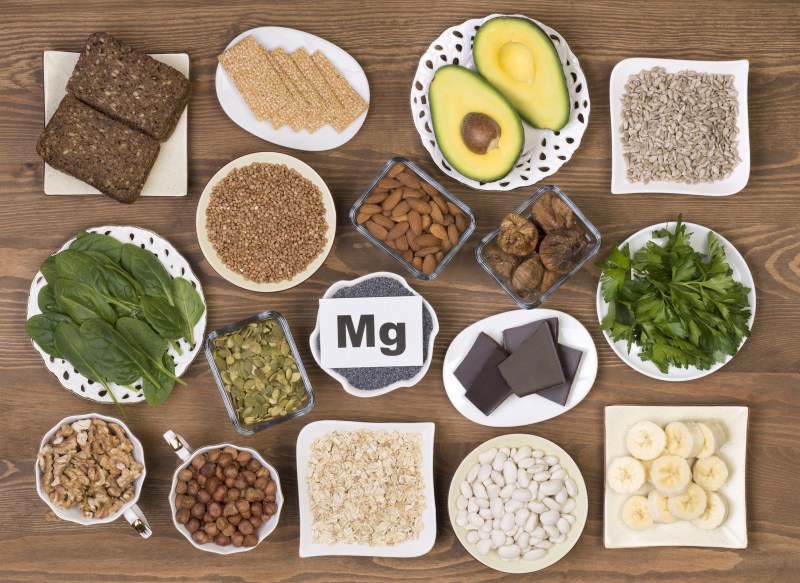15 Evidence-Based Health Benefits of Magnesium
What is Magnesium
The health benefits of magnesium are endless.
Magnesium is essential for the human body, integral for planet Earth, and is used in many electronics today.
When it comes to minerals, magnesium reaches across many platforms of use.
Not only is magnesium an essential mineral used inside your body, but it is also found in the earth’s crust and plants.
It can be used to construct missiles, automobiles, cell phones, and computers.
Magnesium even assists in medicine production.
It is white and gray in color.
While not nearly as trendy or well-known as other minerals in your body, magnesium is just as essential to your diet as potassium or calcium.
In fact, magnesium has an effect on more than 300 bodily chemical reactions.
This includes, but is not limited to, maintaining heart health, sustaining blood vessels, boosting and maintaining energy levels, producing new cells and proteins, and enabling enzyme activity.
These chemical reactions not only affect the overall health of your body, but your ability to perform daily tasks.
The History of Magnesium
Sir Humphrey Davy discovered magnesium in 1755; however, it was much earlier that people began benefiting from this metal.
It is said that in 1618, an English farmer allowed his cows to drink from a nearby well, but they would not drink on account of the water’s bitter taste.
The farmer inspected the well and found its contents to have healing qualities.
As it turns out, the water contained Epsom salts, or magnesium sulphate.
In 1755, MgSO4 became recognized as an official element and the world has been benefiting from its known presence ever since.
Interesting Facts
Still feeling estranged from your body’s friend magnesium?
Here are 15 fun facts about this particular mineral:
- Magnesium is one of the most common mineral deficiencies.
- The chemical element symbol for magnesium is Mg.
- The atomic number for magnesium is 12.
- Magnesium is essential for photosynthesis to take place.
- Magnesium has a boiling point of 1,091F. To put this into perspective, water has a boiling point of 212F.
- Aside from sodium, magnesium is the most plentiful metal found in seawater.
- Magnesium is essential for life; not only for our bodies, but for our planet as well.
- More than 10% of the Earth’s mass is made up from magnesium.
- The human body absorbs anywhere from 10-50% of magnesium intake.
- Magnesium is essential for sleep.
- There is enough magnesium in the Earth to make another planet roughly the size of Mars, plus three moons on the side.
- This element burns both pure carbon dioxide and nitrogen. This means that if you tried to use a carbon dioxide fire-extinguisher to put out a magnesium fire, you would only end up adding to the flames.
- Magnesium is one of the three most commonly used metals.
- The first suggested name from Sir Humphrey Davy was Magnium, but it soon evolved into the name Magnesium.
- Of all the magnesium found in the human body, 60% can be found in the skeleton.
Signs of Magnesium Deficiency
More than 80% of the population suffers from magnesium deficiency.
Magnesium deficiency can have devastating effects on the body if not caught early on.
Knowing the signs early will allow you to combat any inadequacies by introducing more magnesium-rich foods into your diet or by taking a supplement.
Here are some common symptoms of magnesium deficiency (1):
- Respiratory issues
- Fatigue
- Calcium deficiency
- Nausea, dizziness, and fatigue
- Type 2 diabetes
- Poor memory functions or confusion
- Anxiety
- Muscle cramping
- Irregular heartbeat
- Involuntary eye movements or tremors
- Irritability
- Loss of appetite
- Panic attacks
- Heart disease
- Bowel disease
- Blood clots
- Asthma
Health Benefits of Magnesium

Constipation
If you are suffering from Irritable Bowel Syndrome (IBS) or constipation you would do well to turn your attention to magnesium for help.
Getting the proper amount of magnesium helps negate the acids found within your stomach, thereby allowing digested food to run smoothly through your intestines.
This is a natural way to ease the suffering associated with digestive issues.

Magnesium and Bone Health
The bones are one of the main elements of your body that benefit most from magnesium.
Magnesium regulates the levels of calcium absorbed by your body, along with zinc, copper, and vitamin D.
Not only will these minerals help keep your bones healthy and strong, but they may also prevent or lower the chance of developing osteoporosis later in life.(4)

Helps Treat Asthma
Those suffering from chronic asthma have benefited from using magnesium to treat their symptoms (5, 6).
This is due to the fact that many who suffer from asthma are shown to have lower levels of magnesium than normal.
The intake of magnesium supplements may regulate breathing, ease wheezing, and relax the bronchial muscles to promote easier breathing.
Protein Molecules and Enzymes
Enzymes, or protein molecules , work inside the body to stimulate chemical reactions.(7)
Magnesium is one of the key factors in assisting these molecules.

Contributes to Muscle Building
Magnesium contributes to building muscle.
When it comes to toning and exercise, the body requires plenty of iron, zinc, calcium, chromium, and magnesium to build muscle.
Research indicates that even minuscule magnesium deficiencies may hinder muscle growth and performance in athletes.
Magnesium also plays a vital role in your body’s energy production, or ATP (Adenosine Triphosphate).
Studies also show that proper magnesium intake for athletes results in increased peak oxygen intake.

Chronic Pain
A 2010 study done by the Journal of Physiology tested a theory that magnesium is found to reduce nerve pain in patients.
N-methyl-D-aspartate, or NMDA , is a brain chemical that triggers nerve pain when overstimulated.(9)
Magnesium will help settle the NMDA and ease chronic pain.
Eases Muscle Pain
Proper magnesium intake is great for easing sore muscles (10).
Magnesium causes muscles to relax and can, therefore, decrease pain associated with overworked muscles.

Maintains Excellent Heart Health
Those who have a magnesium deficiency may experience negative impacts on their heart health.
A lack of adequate magnesium can lead to heart disease.
A study in the Circulation Journal tested the effectiveness of magnesium supplements on patients with heart disease and found that those who took the supplement twice a day for half a year had better physical stamina and improved blood vessels.

Insulin and Diabetes
Studies show that those suffering from a magnesium deficiency are more at risk of developing diabetes in the future (12).
On the other hand, those who are meeting the recommended daily intake of magnesium will have much healthier options ahead.
This is because magnesium aids in the activity and release of insulin and will get a better handle on maintaining a healthy blood glucose level.
While magnesium is said to be good for individuals with type-2 diabetes, it is always wise to consult your doctor before adding any supplements into your diet.

Keeps Your Teeth Healthy
Since the bones take in the majority of magnesium’s benefits, it’s no surprise that this mineral is fantastic for your teeth.
Magnesium helps your body better absorb calcium, which leads to strengthened bones and well-formed teeth.
Pregnancy
Magnesium is essential for a baby’s growth and a healthy pregnancy (14).
Proper magnesium intake increases the pain threshold, reduces the risk of bone deficiencies, optimizes blood circulation, and may prevent eclampsia.
Magnesium also contributes to a baby’s nutrition while in-utero, as well as tissue recovery and growth.

Migraines
Magnesium can operate as a muscle relaxant, making it an ideal mineral for those who suffer from migraines, muscle tension, or tension headaches.
Chronic migraine sufferers often have low levels of magnesium in the body – in fact, this is often one of the prominent symptoms of a magnesium deficiency.
Adding a magnesium supplement into your diet may reduce both the occurrence and severity of future migraines.
Premenstrual Syndrome
Due to the muscle relaxing qualities that magnesium has on the body, many women have been able to ease cramps and pains brought on by premenstrual syndrome, or PMS (15).
Not only will magnesium help combat aching brought on by PMS, some studies even suggest that women can find relief in mood changes brought on by that time of the month.
Collagen Production
Collagen is beneficial for your whole body.
Not only does it keep your hair healthy and shiny, and your skin looking young and supple, it also aids in many other facets of bodily care.
For example, collagen helps balance hormones and benefits joint and bone health, and digestion . Magnesium helps aid the same proteins that turn into collagen.(16)
Contributes to Bladder Control
People of all ages suffer from bladder control issues ranging from the frequent urge to urinate to problems spotting throughout the day.
Magnesium helps fight infections, interstitial cystitis, and nephritis, all of which can contribute to bladder control issues.
How to Add Magnesium into Your Diet
As you can see, there are many health benefits of magnesium in your daily diet.
Adding that recommended daily intake of magnesium doesn’t have to be a complicated process.
The following foods are easy to find at your local grocery store and are rich in magnesium.
It is recommended that men get at least 400 mg of magnesium in their diet per day and women should have at least 300.

10 Foods Rich in Magnesium
- Bananas – 32 mg per serving
- Kidney Beans – 70 mg per 1 cup
- Spinach – 157 mg per 1 cooked cup (Most leafy greens such as Kale or Swiss chard contain high levels of magnesium that are easy to add into your diet.)
- Oatmeal – 57 mg per 1 cooked cup
- Mackerel – 82 mg
- Peas – 48 mg per 1 cup
- Brown rice–84 mg per serving
- Avocados – 58 mg per 1 avocado
- Broccoli – 51 mg in 1/2 a cooked cup
- Quinoa – 118 mg in 1/2 a cup
Magnesium Supplements
Adding new foods into your diet isn’t always easy or cost-effective.
If you’re struggling to get your recommended daily intake of magnesium, you may want to try taking supplements (17).
Check with your doctor before adding magnesium supplements into your diet because those on certain medications may react poorly to this new dietary addition.
Some popular choices include: magnesium orotate, magnesium citrate, and magnesium carbonate.
These can be found in the vitamin section at your local drug store and are best taken with meals.
Supplements and Precautions
While studies suggest that magnesium supplements do, in fact, work, taking too much magnesium may result in health issues, especially if you have any pre-existing conditions with your kidneys or bowel.
Intake of magnesium supplements too close to the intake of certain antibiotics may negatively impact the effectiveness of the treatment.
Furthermore, taking too much magnesium may begin to hinder the production of other minerals in the body, such as calcium.
Having a diet too rich in magnesium may also lead to overdose, which can cause an upset stomach, low blood pressure, trouble breathing, coma, or, in extreme cases, death.
For these reasons it is always best to consult your doctor before taking a magnesium supplement.
Foods and Behavior to Avoid
If you want to gain the most health benefits from magnesium, you need to pay more attention to what you’re putting in your body.
Carbonated beverages work against magnesium because they bind the mineral to the digestive tract and flush it out of your system before your body has the opportunity to reap its benefits.
Cakes, candies, and pastries should also be avoided to gain the most benefits from magnesium.
Sugar is an anti-nutrient in most cases and may actually consume healthy vitamins and minerals before your body can.
While the anxieties of life can’t always be helped, it’s best to avoid stressful situations if you’re looking to gain the most health benefits from magnesium.
Stress and anxiety can cause a magnesium deficiency in the body and have negative effects on your body and mind.
Certain birth control pills may also reduce the effectiveness of magnesium.
It’s easy to incorporate magnesium-rich foods into your daily diet through healthy vegetables and proteins.
Be sure you are getting the recommended daily intake of magnesium for your gender and age, and always talk to your doctor before introducing new supplements into your daily routine.
The more you know about magnesium’s health benefits, risks, signs of deficiency, as well as the ways in which you can add magnesium into your diet, the better.
Help protect your body from deficiencies and start benefiting from magnesium today.
FDA Compliance
The information on this website has not been evaluated by the Food & Drug Administration or any other medical body. We do not aim to diagnose, treat, cure or prevent any illness or disease. Information is shared for educational purposes only. You must consult your doctor before acting on any content on this website, especially if you are pregnant, nursing, taking medication, or have a medical condition.
HOW WOULD YOU RATE THIS ARTICLE?







I’m always fascinated by how much good our planet gives us. Seems like this is an element we will never run out of.
Yes, minerals are an essential part of human health. Even such “unhealthy” element as iron is crucial for your health. In small quantities, of course.
haha i thought the chemistry class is the only place i’d see this one. you live you learn
Story of my life 🙂
Horrible insomnia is destroying my life…I would like to try to take magnesium supplements!!!Do you think it could help????
I have just taken it today and it is promising. After 1 hour of consuming half the dose recommended, I felt spacey and really wanted to lie down and sleep but I can’t because I was at work. So it should help you with your insomnia. ))
Antonio, I have been in your shoes. I used to have to rely on prescription medication to get to sleep because of my insomnia. That went on for several years. I have now started supplementing with magnesium as well as a couple of others and I’m happy to report I am sleeping better than ever. Magnesium alone did not do the trick for me, but it definitely helped. Hang in there! Better sleep is headed your way.
Be sure to go with a quality product so that your body will absorb it well. I use Garden of Life, Relax and restore. I have been using it for about six months now and it has truly changed my life. I sleep sound through the night, have more energy, feel balanced like never before and my muscle tightness is gone. I honestly found life to be challenging before taking this supplement. A friend takes Calm, same same different company. I encourage the powder form.
Should I consume more magnesium if I work out intensively and often experience muscle pain?
Antonio, I have a horrible time sleeping. I ordered some Natural Calm Magnesium Plus Calcium and I will be trying it tomorrow. I’ve heard it can help very much with sleep disorders.
I have recently ordered some magnesium oil for my back and some moisturiser for my face. I cant waitcto try it out. Thank you for the informative post in Magnesium…i didnt know that Magnesium had so many health benefits…
You are very welcome!
Great article, Helen! I took several notes because I didn’t want to forget all the healthy benefits of magnesium. I couldn’t help but think of several friends who have symptoms that may be related to magnesium deficiency. I will definitely be sharing this article with them.
Thanks!
You can always bookmark this page, just in case :).
Is true that beans are also high in magnesium? What is the best way to cook them? If I boil them in the soup, will it wash away magnesium?
How should I incorporate magnesium into my 9-month-old son?
It’s luck I found your article! I think I have symptoms of magnesium deficiency. What test can I take to check this?
I thank you all for your input.its true.you learn something new every day
I have Type 2 Diabetes and suffer from muscle aches and nerve pain in my legs and hands. Can taking a magnesium supplement really help?
Is is bad to take magnesium if one is taking a male enhancement supplement?
Neb
Amazing.I v battled with insinmia for years n migraines. My friend gave me some Epsom salts to nix with little water n rub all over my body.She said I should also drink half a teaspoon of it in a glass of warm water.My migraine has gone.Am really greatful to Allah
Does magnesium have any benefit with anxiety and depression?